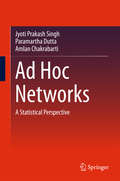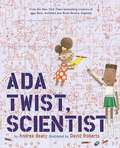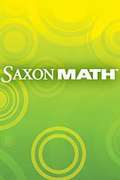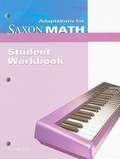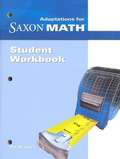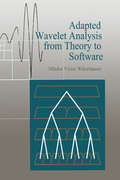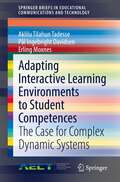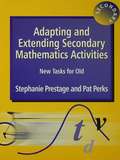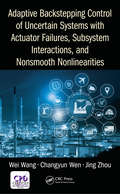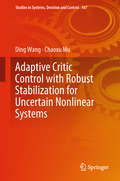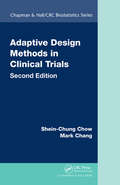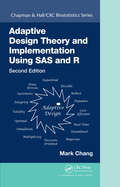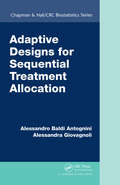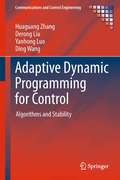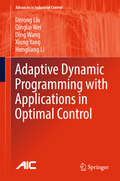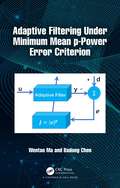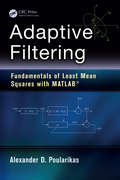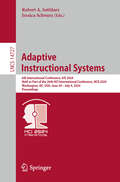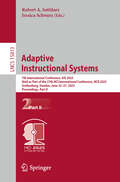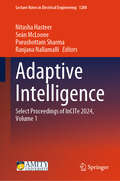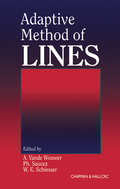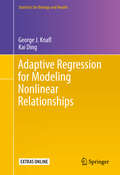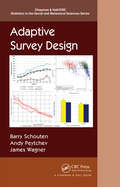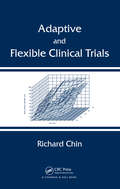- Table View
- List View
Ad Hoc Networks: A Statistical Perspective
by Paramartha Dutta Amlan Chakrabarti Jyoti Prakash SinghThis book identifies the time-dependent network parameters: neighbour count, link load, path length, cluster count and delay, and presents a first-of-its-kind discussion on temporal parameters in mobile ad hoc networks. Frequent topology changes and multiple link failures occur in mobile ad hoc network due to arbitrary and random movement of nodes. <P><P>This dynamic environment challenges the delivery of data and makes it essential to find better models for network parameters that are shifting with time. The parameters identified are put into the framework of time series because of their temporal characteristic, and when they are modelled using time series framework they exhibit a sound fit with Autoregressive AR(p) models of order p. <P>The order p is evaluated for each fitted model and found to lie between one and three. The book also analyses the dependence of end-to-end delay of ad hoc network on various external factors such as the number of nodes, routing protocol, mobility models and path length and develops two prediction models. The book will be useful for researchers and professionals alike.
Ada Twist, Scientist
by David Roberts Andrea BeatyLike her classmates, builder Iggy and inventor Rosie, scientist Ada, a character of color, has a boundless imagination and has always been hopelessly curious. Why are there pointy things stuck to a rose? Why are there hairs growing inside your nose? When her house fills with a horrific, toe-curling smell, Ada knows it’s up to her to find the source. What would you do with a problem like this? Not afraid of failure, Ada embarks on a fact-finding mission and conducts scientific experiments, all in the name of discovery. But, this time, her experiments lead to even more stink and get her into trouble! Inspired by real-life makers such as Ada Lovelace and Marie Curie, Ada Twist, Scientist champions girl power and women scientists, and brings welcome diversity to picture books about girls in science. Touching on themes of never giving up and problem solving, Ada comes to learn that her questions might not always lead to answers, but rather to more questions. She may never find the source of the stink, but with a supportive family and the space to figure it out, she’ll be able to feed her curiosity in the ways a young scientist should.
Adaptations for Saxon Math Student Reference Guide Intermediate 3-5
by Pat WrigleyNIMAC-sourced textbook
Adapted Wavelet Analysis: From Theory to Software
by Mladen Victor WickerhauserThis detail-oriented text is intended for engineers and applied mathematicians who must write computer programs to perform wavelet and related analysis on real data. It contains an overview of mathematical prerequisites and proceeds to describe hands-on programming techniques to implement special programs for signal analysis and other applications.
Adapting Interactive Learning Environments to Student Competences: The Case for Complex Dynamic Systems (SpringerBriefs in Educational Communications and Technology)
by Aklilu Tilahun Tadesse Pål Ingebright Davidsen Erling MoxnesThis monograph focuses on the design of personalized and adaptive online interactive learning environment (OILE) to enhance students’ learning in and about complex dynamic systems (CDS). Numerous studies show that students experience difficulties when learning in and about CDS. The difficulties are due to challenges originating from a) the structural complexity of CDS, (b) the production of dynamic behavior from the underlying systems structure, and (c) methods, techniques and tools employed in the analysis of such systems. Despite the fact that studies have uncovered such learning challenges, it is still not well understood how we may effectively address these challenges. In this monograph, the authors provide some answers as to how we may best improve our cognitive capabilities to meet these challenges by way of effective instructional methods, techniques, and tools and their implementation in the form of an OILE. The OILE developed for this purpose, builds on a five-step holistic instructional design framework; identification of instructional design models, identification of authentic learning material, identification of instructional methods, identification of instructional techniques, and design of the interface and implementation of the tool. In this OILE development, six well-documented instructional design models were considered; a four component instructional design, first principles of instruction, constructivists learning environment, task centered instruction, cognitive apprenticeship, and elaboration theory.
Adapting and Extending Secondary Mathematics Activities: New Tasks FOr Old
by Pat Perks Stephanie PrestageThis book is designed to assist teachers to get the most out of the textbooks or mathematics schemes used in their schools, providing methods of extending the activities offered to learners.
Adaptive Backstepping Control of Uncertain Systems with Actuator Failures, Subsystem Interactions, and Nonsmooth Nonlinearities
by Wei Wang Jing Zhou Changyun WenIn practice, actuators often undergo failures and various factors influence its effectiveness. Also due to the increasing complexity of large-scale systems, subsystems are often interconnected, whereas the interactions between any two subsystems are difficult to deal with. This book details a series of new methodologies of designing and analyzing adaptive backstepping control systems involving treatment on actuator failures, subsystem interactions and nonsmooth nonlinearities. Moreover, it discusses some interesting open issues in adaptive failure accommodation, decentralized adaptive control and distributed adaptive coordinated control.
Adaptive Critic Control with Robust Stabilization for Uncertain Nonlinear Systems (Studies in Systems, Decision and Control #167)
by Ding Wang Chaoxu MuThis book reports on the latest advances in adaptive critic control with robust stabilization for uncertain nonlinear systems. Covering the core theory, novel methods, and a number of typical industrial applications related to the robust adaptive critic control field, it develops a comprehensive framework of robust adaptive strategies, including theoretical analysis, algorithm design, simulation verification, and experimental results. As such, it is of interest to university researchers, graduate students, and engineers in the fields of automation, computer science, and electrical engineering wishing to learn about the fundamental principles, methods, algorithms, and applications in the field of robust adaptive critic control. In addition, it promotes the development of robust adaptive critic control approaches, and the construction of higher-level intelligent systems.
Adaptive Design Methods in Clinical Trials (Chapman & Hall/CRC Biostatistics Series)
by Mark Chang Shein-Chung ChowWith new statistical and scientific issues arising in adaptive clinical trial design, including the U.S. FDA's recent draft guidance, a new edition of one of the first books on the topic is needed. Adaptive Design Methods in Clinical Trials, Second Edition reflects recent developments and regulatory positions on the use of adaptive designs in clini
Adaptive Design Theory and Implementation Using SAS and R (Chapman & Hall/CRC Biostatistics Series)
by Mark ChangGet Up to Speed on Many Types of Adaptive DesignsSince the publication of the first edition, there have been remarkable advances in the methodology and application of adaptive trials. Incorporating many of these new developments, Adaptive Design Theory and Implementation Using SAS and R, Second Edition offers a detailed framework to understand the
Adaptive Designs for Sequential Treatment Allocation
by Alessandro Baldi Antognini Alessandra GiovagnoliAdaptive Designs for Sequential Treatment Allocation presents a rigorous theoretical treatment of the results and mathematical foundation of adaptive design theory. The book focuses on designing sequential randomized experiments to compare two or more treatments incorporating information accrued along the way. The authors first introduce the terminology and statistical models most commonly used in comparative experiments. They then illustrate biased coin and urn designs that only take into account past treatment allocations as well as designs that use past data, such as sequential maximum likelihood and various types of doubly adaptive designs. The book also covers multipurpose adaptive experiments involving utilitarian choices and ethical issues. It ends with adaptive methods that include covariates in the design. The appendices present basic tools of optimal design theory and address Bayesian adaptive designs.This book helps readers fully understand the theoretical properties behind various adaptive designs. Readers are then equipped to choose the best design for their experiment.
Adaptive Dynamic Programming for Control: Algorithms and Stability (Communications and Control Engineering)
by Yanhong Luo Huaguang Zhang Ding Wang Derong LiuThere are many methods of stable controller design for nonlinear systems. In seeking to go beyond the minimum requirement of stability, Adaptive Dynamic Programming in Discrete Time approaches the challenging topic of optimal control for nonlinear systems using the tools of adaptive dynamic programming (ADP). The range of systems treated is extensive; affine, switched, singularly perturbed and time-delay nonlinear systems are discussed as are the uses of neural networks and techniques of value and policy iteration. The text features three main aspects of ADP in which the methods proposed for stabilization and for tracking and games benefit from the incorporation of optimal control methods: * infinite-horizon control for which the difficulty of solving partial differential Hamilton-Jacobi-Bellman equations directly is overcome, and proof provided that the iterative value function updating sequence converges to the infimum of all the value functions obtained by admissible control law sequences; * finite-horizon control, implemented in discrete-time nonlinear systems showing the reader how to obtain suboptimal control solutions within a fixed number of control steps and with results more easily applied in real systems than those usually gained from infinite-horizon control; * nonlinear games for which a pair of mixed optimal policies are derived for solving games both when the saddle point does not exist, and, when it does, avoiding the existence conditions of the saddle point. Non-zero-sum games are studied in the context of a single network scheme in which policies are obtained guaranteeing system stability and minimizing the individual performance function yielding a Nash equilibrium. In order to make the coverage suitable for the student as well as for the expert reader, Adaptive Dynamic Programming in Discrete Time: * establishes the fundamental theory involved clearly with each chapter devoted to a clearly identifiable control paradigm; * demonstrates convergence proofs of the ADP algorithms to deepen understanding of the derivation of stability and convergence with the iterative computational methods used; and * shows how ADP methods can be put to use both in simulation and in real applications. This text will be of considerable interest to researchers interested in optimal control and its applications in operations research, applied mathematics computational intelligence and engineering. Graduate students working in control and operations research will also find the ideas presented here to be a source of powerful methods for furthering their study.
Adaptive Dynamic Programming with Applications in Optimal Control (Advances in Industrial Control)
by Ding Wang Derong Liu Qinglai Wei Xiong Yang Hongliang LiThis book covers the most recent developments in adaptive dynamic programming (ADP). The text begins with a thorough background review of ADP making sure that readers are sufficiently familiar with the fundamentals. In the core of the book, the authors address first discrete- and then continuous-time systems. Coverage of discrete-time systems starts with a more general form of value iteration to demonstrate its convergence, optimality, and stability with complete and thorough theoretical analysis. A more realistic form of value iteration is studied where value function approximations are assumed to have finite errors. Adaptive Dynamic Programming also details another avenue of the ADP approach: policy iteration. Both basic and generalized forms of policy-iteration-based ADP are studied with complete and thorough theoretical analysis in terms of convergence, optimality, stability, and error bounds. Among continuous-time systems, the control of affine and nonaffine nonlinear systems is studied using the ADP approach which is then extended to other branches of control theory including decentralized control, robust and guaranteed cost control, and game theory. In the last part of the book the real-world significance of ADP theory is presented, focusing on three application examples developed from the authors' work: * renewable energy scheduling for smart power grids; * coal gasification processes; and * water-gas shift reactions. Researchers studying intelligent control methods and practitioners looking to apply them in the chemical-process and power-supply industries will find much to interest them in this thorough treatment of an advanced approach to control.
Adaptive Filtering Under Minimum Mean p-Power Error Criterion
by Badong Chen Wentao MaAdaptive filtering still receives attention in engineering as the use of the adaptive filter provides improved performance over the use of a fixed filter under the time-varying and unknown statistics environments. This application evolved communications, signal processing, seismology, mechanical design, and control engineering. The most popular optimization criterion in adaptive filtering is the well-known minimum mean square error (MMSE) criterion, which is, however, only optimal when the signals involved are Gaussian-distributed. Therefore, many "optimal solutions" under MMSE are not optimal. As an extension of the traditional MMSE, the minimum mean p-power error (MMPE) criterion has shown superior performance in many applications of adaptive filtering. This book aims to provide a comprehensive introduction of the MMPE and related adaptive filtering algorithms, which will become an important reference for researchers and practitioners in this application area. The book is geared to senior undergraduates with a basic understanding of linear algebra and statistics, graduate students, or practitioners with experience in adaptive signal processing.Key Features: Provides a systematic description of the MMPE criterion. Many adaptive filtering algorithms under MMPE, including linear and nonlinear filters, will be introduced. Extensive illustrative examples are included to demonstrate the results.
Adaptive Filtering: Fundamentals of Least Mean Squares with MATLAB® (Electrical Engineering Primer Ser.)
by Alexander D. PoularikasAdaptive filters are used in many diverse applications, appearing in everything from military instruments to cellphones and home appliances. Adaptive Filtering: Fundamentals of Least Mean Squares with MATLAB® covers the core concepts of this important field, focusing on a vital part of the statistical signal processing area—the least mean square (LMS) adaptive filter. This largely self-contained text: Discusses random variables, stochastic processes, vectors, matrices, determinants, discrete random signals, and probability distributions Explains how to find the eigenvalues and eigenvectors of a matrix and the properties of the error surfaces Explores the Wiener filter and its practical uses, details the steepest descent method, and develops the Newton’s algorithm Addresses the basics of the LMS adaptive filter algorithm, considers LMS adaptive filter variants, and provides numerous examples Delivers a concise introduction to MATLAB®, supplying problems, computer experiments, and more than 110 functions and script files Featuring robust appendices complete with mathematical tables and formulas, Adaptive Filtering: Fundamentals of Least Mean Squares with MATLAB® clearly describes the key principles of adaptive filtering and effectively demonstrates how to apply them to solve real-world problems.
Adaptive Instructional Systems: 6th International Conference, AIS 2024, Held as Part of the 26th HCI International Conference, HCII 2024, Washington, DC, USA, June 29–July 4, 2024, Proceedings (Lecture Notes in Computer Science #14727)
by Jessica Schwarz Robert A. SottilareThis book constitutes the refereed proceedings of 6th International Conference on Adaptive Instructional Systems, AIS 2024, held as part of the 26th International Conference, HCI International 2024, which took place in Washington, DC, USA, during June 29-July 4, 2024. The total of 1271 papers and 309 posters included in the HCII 2024 proceedings was carefully reviewed and selected from 5108 submissions. The HCII-AIS 2024 contributions have been organized in the following topical sections: Designing and developing adaptive instructional systems; adaptive learning experiences; AI in adaptive learning.
Adaptive Instructional Systems: 7th International Conference, AIS 2025, Held as Part of the 27th HCI International Conference, HCII 2025, Gothenburg, Sweden, June 22–27, 2025, Proceedings, Part I (Lecture Notes in Computer Science #15812)
by Jessica Schwarz Robert A. SottilareThe two-volume set LNCS 15812-15813 constitutes the thoroughly refereed proceedings of the 7th International Conference on Adaptive Instructional Systems, AIS 2025, held as part of the 27th HCI International Conference on Human-Computer Interaction, HCII 2025, which took place in Gothenburg, Sweden, in June 2025. The total of 1430 papers and 355 posters included in the HCII 2025 proceedings was carefully reviewed and selected from 7972 submissions. The two volumes cover topics as follows: Part I: Adaptive Training and Education; Cognitive Modeling of Adaptive Instructional Systems; Part II: Adaptive and Personalized Learning; Emerging Technologies in Adaptive Instruction.
Adaptive Instructional Systems: 7th International Conference, AIS 2025, Held as Part of the 27th HCI International Conference, HCII 2025, Gothenburg, Sweden, June 22–27, 2025, Proceedings, Part II (Lecture Notes in Computer Science #15813)
by Jessica Schwarz Robert A. SottilareThe two-volume set LNCS 15812-15813 constitutes the thoroughly refereed proceedings of the 7th International Conference on Adaptive Instructional Systems, AIS 2025, held as part of the 27th HCI International Conference on Human-Computer Interaction, HCII 2025, which took place in Gothenburg, Sweden, in June 2025. The total of 1430 papers and 355 posters included in the HCII 2025 proceedings was carefully reviewed and selected from 7972 submissions. The two volumes cover topics as follows: Part I: Adaptive Training and Education; Cognitive Modeling of Adaptive Instructional Systems; Part II: Adaptive and Personalized Learning; Emerging Technologies in Adaptive Instruction.
Adaptive Intelligence: Select Proceedings of InCITe 2024, Volume 1 (Lecture Notes in Electrical Engineering #1280)
by Seán McLoone Nitasha Hasteer Purushottam Sharma Ranjana NallamalliThis book comprises the select peer-reviewed proceedings of the 4th International Conference on Information Technology (InCITe-2024). It aims to provide a comprehensive knowledge base encompassing state-of-the-art research and development in adaptive intelligence, decision intelligence, artificial intelligence, deep learning, machine learning, data science, and enabling technologies for IoT, blockchain, and other futuristic technologies. It covers various topics that span cutting-edge, collaborative technologies and areas of computation. The content would serve as a rich knowledge repository on information & communication technologies, neural networks, fuzzy systems, natural language processing, data mining & warehousing, big data analytics, cloud computing, social networks, and intelligence, decision-making, and modeling, information systems, IT architectures, and security related aspects. This book provides a valuable resource for those in academia and industry.
Adaptive Method of Lines
by A. Vande Wouwer Ph. Saucez W. E. SchiesserThe general Method of Lines (MOL) procedure provides a flexible format for the solution of all the major classes of partial differential equations (PDEs) and is particularly well suited to evolutionary, nonlinear wave PDEs. Despite its utility, however, there are relatively few texts that explore it at a more advanced level and reflect the method's
Adaptive Regression for Modeling Nonlinear Relationships (Statistics for Biology and Health)
by George J. Knafl Kai DingThis book presents methods for investigating whether relationships are linear or nonlinear and for adaptively fitting appropriate models when they are nonlinear. Data analysts will learn how to incorporate nonlinearity in one or more predictor variables into regression models for different types of outcome variables. Such nonlinear dependence is often not considered in applied research, yet nonlinear relationships are common and so need to be addressed. A standard linear analysis can produce misleading conclusions, while a nonlinear analysis can provide novel insights into data, not otherwise possible. A variety of examples of the benefits of modeling nonlinear relationships are presented throughout the book. Methods are covered using what are called fractional polynomials based on real-valued power transformations of primary predictor variables combined with model selection based on likelihood cross-validation. The book covers how to formulate and conduct such adaptive fractional polynomial modeling in the standard, logistic, and Poisson regression contexts with continuous, discrete, and counts outcomes, respectively, either univariate or multivariate. The book also provides a comparison of adaptive modeling to generalized additive modeling (GAM) and multiple adaptive regression splines (MARS) for univariate outcomes. The authors have created customized SAS macros for use in conducting adaptive regression modeling. These macros and code for conducting the analyses discussed in the book are available through the first author's website and online via the book s Springer website. Detailed descriptions of how to use these macros and interpret their output appear throughout the book. These methods can be implemented using other programs. "
Adaptive Survey Design (Chapman & Hall/CRC Statistics in the Social and Behavioral Sciences)
by James Wagner Barry Schouten Andy PeytchevAdaptive survey designs (ASDs) provide a framework for data-driven tailoring of data collection procedures to different sample members, often for cost and bias reduction. People vary in how likely they are to respond and in how they respond. This variation leads to opportunities to selectively deploy design features in order to control both nonresponse and measurement errors. ASD aims at the optimal matching of design features and the characteristics of respondents given the survey budget. Such a goal is sensible, but ASD requires investment in more advanced technical systems and management infrastructure and asks for the collection of relevant auxiliary data. So what are current best practices in ASD? And is ASD worthwhile when the same auxiliary data are employed in the estimation afterwards? In this book, the authors provide answers to these questions, and much more.
Adaptive and Flexible Clinical Trials
by Richard ChinAdaptive clinical trial designs, unlike traditional fixed clinical trial designs, enable modification of studies in response to the data generated in the course of the trial. This often results in studies that are substantially faster, more efficient, and more powerful. Recent developments in web-based real-time data entry and advances in statistic
